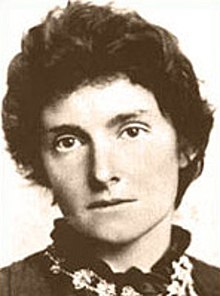The Ballad Of The White Lady
Edith Nesbit 1858 (Kennington, Surrey ) – 1924 (New Romney, Kent)
SIR GEOFFREY met the white lady
Upon his marriage morn,
Her eyes were blue as cornflowers are,
Her hair was gold like corn.
Sir Geoffrey gave the white lady
A posy of roses seven,
'You are the fairest May,' said he,
'That ever strayed from Heaven.'
Sir Geoffrey by the white lady
Was lured away to shame,
For seven long years of prayers and tears
No tidings of him came.
Then she who should have been his bride
A mighty oath she swore,
'For seven long years I have wept and prayed,
Now I will pray no more.
'Since God and all the saints of Heaven
Bring not my lord to me,
I will go down myself to hell
And bring him back,' said she.
She crept to the white lady's bower,
The taper's flame was dim,
And there Sir Geoffrey lay asleep,
And the white witch sat by him.
Her arm was laid across his neck,
Her gold hair on his face,
And there was silence in the room
As in a burial-place.
And there were gems and carven cups,
And 'broidered bridal gear--
'Whose bridal is this?' the lady said,
'And what knight have ye here?'
'The good knight here ye know full well,
He was your lord, I trow,
But I have taken him from your side,
And I am his lady now.
'This seven year with right good cheer
We twain our bridal keep,
So take for your mate another knight
And let my dear lord sleep.'
Then up and spake Sir Geoffrey's bride,
'What bridal cheer is this?
I would think scorn to have the lips
Who could not have the kiss!
'I would think scorn to take the half
Who could not have the whole;
I would think scorn to steal the body
Who could not take the soul!
'For, though ye hold his body fast
This seven weary year,
His soul walks ever at my side
And whispers in my ear.
'I would think scorn to hold in sleep
What, if it waked, would flee,
So let his body join his soul
And both fare forth with me;
'For I have learned a spell more strong
Than yours that laid him low,
And I will speak it for his sake
Because I love him so!'
The white lady threw back her hair,
Her eyes began to shine--
'His soul is thine these seven years?--
To-night it shall be mine!
'I have been brave to hold him here
While seven long years befell,
Rather than let a bridal be
Whose seed should flower in hell.
'I have not looked into his eyes
Nor joined my lips to his,
For fear his soul should spring to flame
And shrivel at my kiss.
'I have been brave to watch his sleep
While the long hours come and go,
To hold the body without the soul,
Because I love him so.
'But since his soul this seven year
Has sat by thee,' she said,
'His body and soul to-night shall lie
Upon my golden bed.
'Thou hast no need to speak the spell
That thou hast learned,' said she,
'For I will wake him from his sleep
And take his soul from thee.'
She stooped above him where he lay,
She laid her lips on his;
He stirred, he spake: 'These seven long years
I have waited for thy kiss.
'My soul has hung upon thy lips
And trembled at thy breath,
Thou hast given me life in a cup to drink,
As God will give me death.
'Why didst thou fear to kill my soul
Which only lives for thee?
Thou hast put seven wasted years,
O love, 'twixt thee and me.'
Font size:
Submitted on May 13, 2011
Modified on March 05, 2023
- 3:06 min read
- 143 Views
Quick analysis:
| Scheme | abxb acac adxd efxf caga xhih xjxj xklm gnex kixi eopo xqaq xkem iaqa xnxN xrsr mgag xtdo inqN klxl gaia xtso puxu qasa |
|---|---|
| Closest metre | Iambic tetrameter |
| Characters | 3,087 |
| Words | 630 |
| Stanzas | 24 |
| Stanza Lengths | 4, 4, 4, 4, 4, 4, 4, 4, 4, 4, 4, 4, 4, 4, 4, 4, 4, 4, 4, 4, 4, 4, 4, 4 |
Translation
Find a translation for this poem in other languages:
Select another language:
- - Select -
- 简体中文 (Chinese - Simplified)
- 繁體中文 (Chinese - Traditional)
- Español (Spanish)
- Esperanto (Esperanto)
- 日本語 (Japanese)
- Português (Portuguese)
- Deutsch (German)
- العربية (Arabic)
- Français (French)
- Русский (Russian)
- ಕನ್ನಡ (Kannada)
- 한국어 (Korean)
- עברית (Hebrew)
- Gaeilge (Irish)
- Українська (Ukrainian)
- اردو (Urdu)
- Magyar (Hungarian)
- मानक हिन्दी (Hindi)
- Indonesia (Indonesian)
- Italiano (Italian)
- தமிழ் (Tamil)
- Türkçe (Turkish)
- తెలుగు (Telugu)
- ภาษาไทย (Thai)
- Tiếng Việt (Vietnamese)
- Čeština (Czech)
- Polski (Polish)
- Bahasa Indonesia (Indonesian)
- Românește (Romanian)
- Nederlands (Dutch)
- Ελληνικά (Greek)
- Latinum (Latin)
- Svenska (Swedish)
- Dansk (Danish)
- Suomi (Finnish)
- فارسی (Persian)
- ייִדיש (Yiddish)
- հայերեն (Armenian)
- Norsk (Norwegian)
- English (English)
Citation
Use the citation below to add this poem to your bibliography:
Style:MLAChicagoAPA
"The Ballad Of The White Lady" Poetry.com. STANDS4 LLC, 2024. Web. 19 Apr. 2024. <https://www.poetry.com/poem/8928/the-ballad-of-the-white-lady>.



Discuss the poem The Ballad Of The White Lady with the community...
Report Comment
We're doing our best to make sure our content is useful, accurate and safe.
If by any chance you spot an inappropriate comment while navigating through our website please use this form to let us know, and we'll take care of it shortly.
Attachment
You need to be logged in to favorite.
Log In